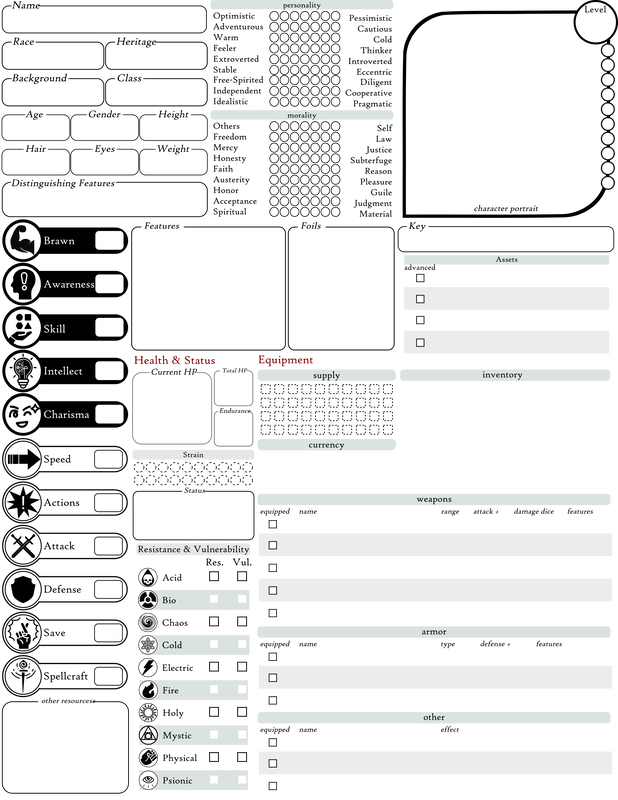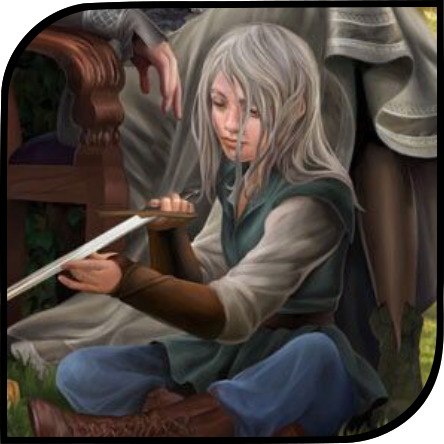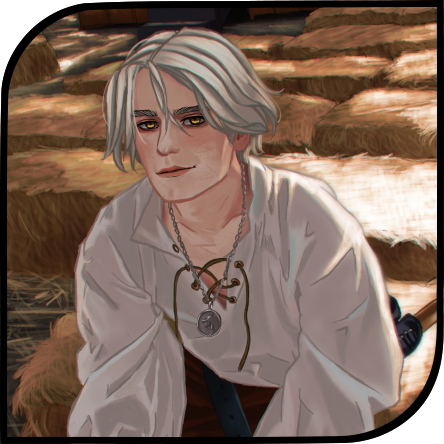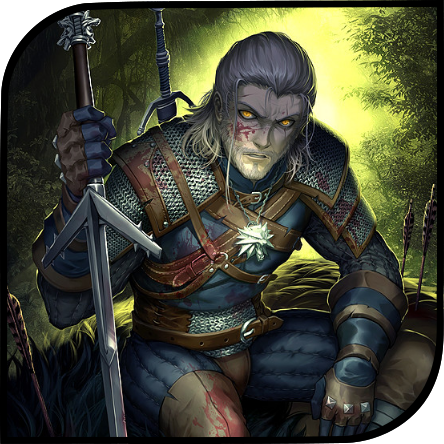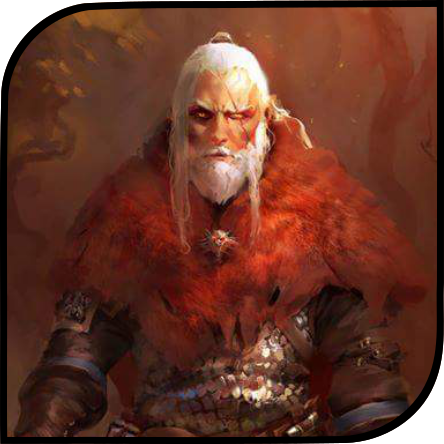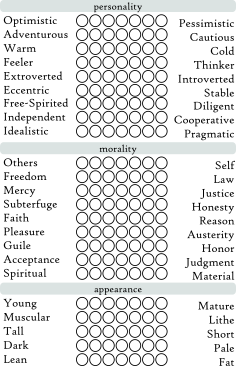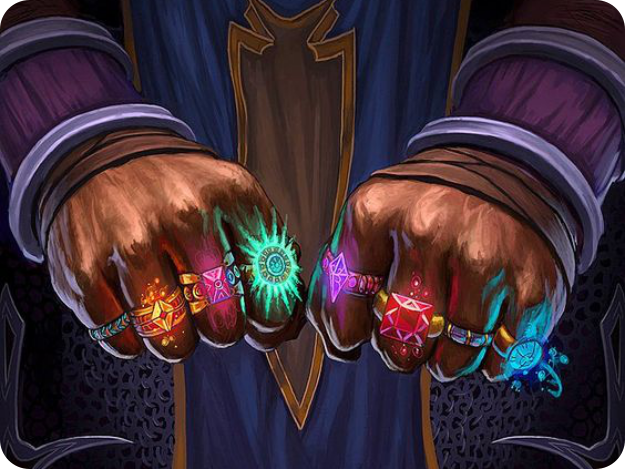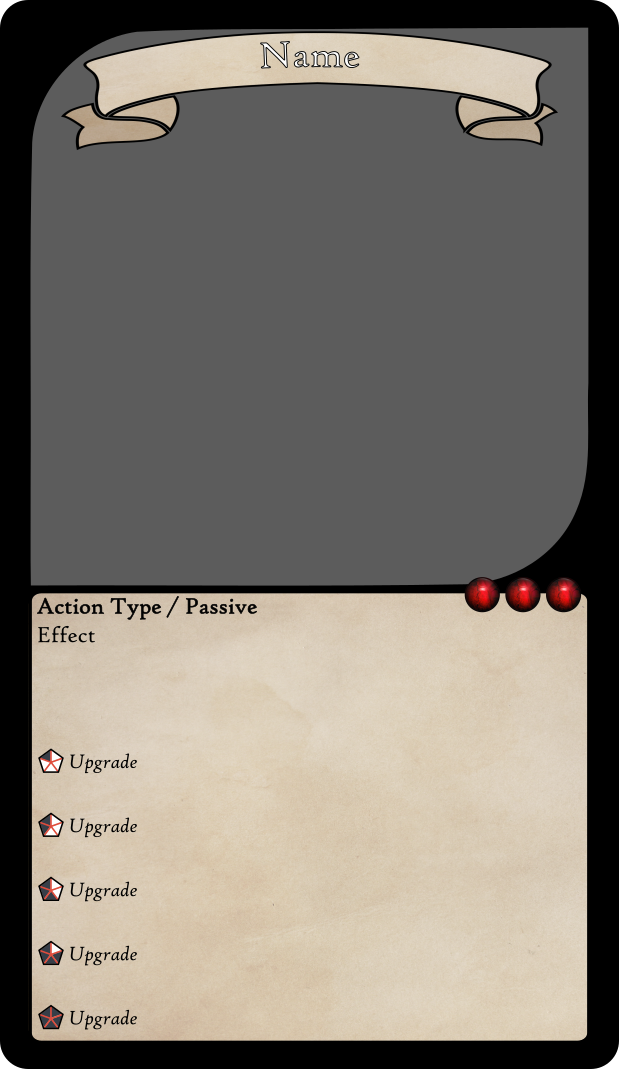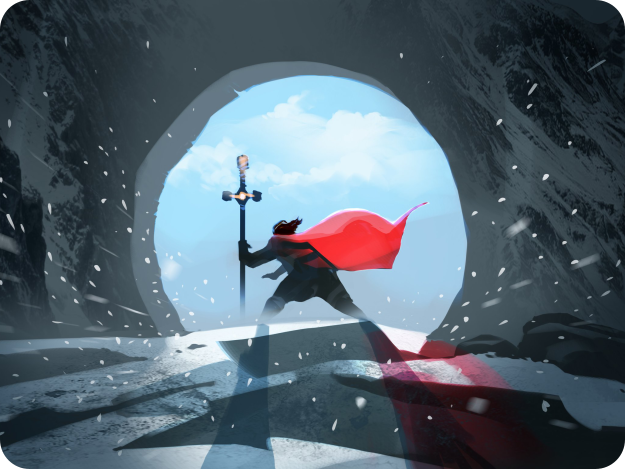|
Whatever story unfolds, you are a person of great significance within this narrative. You might not be the most powerful or influential person in the world, but you (and the other player characters) are the center of your group's tale. However your story unfolds, the first thing you as a player must do is create the character you will portray. This is a simple process in which you'll decide all the important details about your character.
Though character creation generally happens in the order detailed below, there is no prescribed method written in stone; feel free to create your character in any order you choose, tracking back to re-write or looking ahead at new options as it suits you. Note that once the game begins, however, your decisions are locked in and can only be changed if the GM allows it. When considering who your character will be, take into account the needs of the narrative and the dynamic of the group along, with any suggestions the GM might have as to how your character could contribute to the larger story. The last thing you want is to be a brooding assassin in a group of happy-go-lucky heroes or a ridiculous joke-character in the midst of serious role-players. Consider not only your own enjoyment, but what your character will bring to the table in terms of both ability and overall tone. The process of character creation need not be one of constant analysis, hemming and hawing over which option will lead to the most powerful character. In fact, it is often more rewarding to play a character who is deeply flawed or has a glaring weakness to overcome. What’s most important is that you, the player, have a vested interest in your character’s well-being and a desire to see them achieve their goals, whatever they may be. |
character essentials
|
Select your SPECIES gain a Special Asset from your Species Decide your HERITAGE pick a Feature associated with your Heritage learn the Language of your people |
the four peoples of AfterLight from left to right: Mechan, Elf, Human, and Saurian
|
Many groups of genetically and culturally diverse peoples inhabit the city of Belhaven. Once native to each of AfterLight's three continents, the greatness of Belhaven has drawn a sampling of all people groups though its gates over the ages. Humans are the most populous of Belhaven's citizens, hailing from the continent of Athrain, upon whose western coast Belhaven is believed to be located. Saurians were once the lords of Khemet, the southernmost continent, ruling over their majestic homeland with dignity, wisdom, and an iron talon. The Elves (or T'lalokee as they are known in their native tongue) come from across the ocean, from the wild and magical lands of Calinost (Elaesqua to the Elves). Finally, the Mechan come not from place, but from time. They are remnants of the age that once was, who have awakened after centuries of torpor to discover and rescue a world on the brink.
On the SPECIES page, you will find greater details on each of the three races, including:
- Common Names: Every culture has different naming conventions. Depending on Ethnicity and Homeland, a character may follow these conventions or break with them completely.
- Appearance: Each of AfterLight's Species has a diverse range of appearances, but all who belong to this people fall within certain parameters due to inherited biology. Suggestions for how your character may appear (and how they might break the mold) are offered here.
- Heritage: Within each people group are several sub-groups with unique ancestries and a shared cultural heritage, each one emphasizing a diverse set of social norms, moral philosophies, and cultural interests. Because of this, each Heritage offers a unique array of Features to choose from. Pick one Feature associated with your Heritage. Note that you are allowed to select a Heritage associated with another Species if there is a justifiable reason for you to have this Heritage (a Human raised by Elves, for instance).
- Special Asset: The unique biology, history, culture, and social status of each species affords most of its people with a unique benefit. Only members of a species can acquire and use its Special Asset, and all do so at the Basic Level. When you are able to pick an Asset later on in character creation, you can either take a totally new Asset at the Basic Level or upgrade your Special Asset to the Advanced Level.
- Language: In addition to the common tongue of Belhaven, you may also speak the language of your people, which has been preserved and passed down through generations, even after the end of the world.
Decide Your AgeAdventurers are a diverse group, differing from one another in many ways, not the least of which is age. How old your character is has less to do with their ability to participate in the story and more to do with how they see the world. Children and youths tend to be more optimistic, emotional, and immature while wisdom, rigidity, and more than a little cynicism creeps in as the years go by.
Age for Player Characters isn't measured in years, but in four stages: Child, Youth, Adult, and Elder. The specific age range for each of these stages appears on each Species page since different Species age at different rates. Decide which of these stages your character is in. |
Determine Your AppearanceDecide all the finer details about your character's appearance; their hair and eye color, their biological sex, their height and weight, and any other distinguishing features they may have. Each Species has some suggestions regarding what hair/eye colors, and height to weight ratios are most common amongst its males and females, but as an adventurer living life outside the norm, it's not required of you to color inside these lines.
Bear in mind that none of the choices you make here have any (numerical) effect on gameplay, but may affect how other characters in the story react to you. If you'd like to give your character a distinguishing feature, but aren't sure what to give them (or just want some inspiration), you can roll 1d20 and consult the table below or just pick the one you like best.
1: A prominent scar cuts its way across your face 2: A severe burn mars your features 3: Your eyes are a bright and unusual color 4: Your hair is a bright, absurd color 5: An elaborate tattoo covers your face 6: You have an extra finger on one hand 7: You have vitiligo; dark skin with light patches 8: You have an abundance of freckles all over 9: Your breasts/genitals are uncomfortably large 10: You have a long, large, prominent nose 11: Your eyes are two completely different colors 12: You are exceptionally tall for your race & gender 13: You are exceptionally short for your race & gender 14: You have an odd birthmark in a visible place 15: You have a large, prominent mole on your face 16: Your nose is crooked, having been once broken 17: Your hair is unnaturally gray for your age 18: You've gone bald prematurely 19: You always wear a distinguishing piece of clothing 20: You speak with a stutter, lisp, or thick accent |
Personality, Morality, & Appearance
|
BondsIn order to easily leap into the story, each character should have some connection to another PC, a major NPC, or a Guild or organization pivotal to the story. This helps draw the character into the action (even if they wouldn’t otherwise get involved) and gives some explanation as to how and why these characters come together to form a cohesive group.
Though you may have up any number of relationships to any number of PCs, NPCs, and groups it is recommended that you have at least one relationship with a PC of your choice and one link to a major NPC or organization (the GM can help you with this part). Sample Relationships
A list of sample relationships can be found below and you are encouraged to come up with your own connections. A good relationship
I’m completely in love with __________. I hope they feel the same way about me. __________ saved my life and I owe them a debt of honor. I am following after __________, hoping they’ll teach me their ways. Even if we aren’t directly related, I consider __________ a part of my family. I have seen a disturbing prophecy concerning __________. I am sworn to defend __________ with my life. __________ is the only person who’s ever beaten me in a fair fight. One day, I’ll fight them again and win. __________ knows more than they’re letting on. I intend to find out what they know. I’ve heard stories about __________, but I never thought them to be a real person. I’ve saved __________’s life many times. They would be in real trouble without me around. __________ and I are related by blood. I’ve done terrible things in the past, especially to __________. Helping them is the least I can do to atone. I’m fascinated by __________ and want to learn all I can about them. __________ is so well-loved. Maybe if I stick with them long enough, some of their renown will rub off on me. I made a promise to __________’s mother/father concerning them and I intend to honor it. The stars have told me __________ is someone important, someone I must journey with. __________ is painfully naive. I’ll teach them the ways of the world. I admire __________ and want to live up to their example. __________ and I are constantly at odds with one another. I can’t let them one-up me. __________ is paying me to protect them. I stole something from __________ and they haven’t realized it yet. __________ and I once fought a war on opposing sides. My elaborate plans for revenge involve __________ and they don’t even realize it. __________ and I are bound by a strange magical pact. No one seems to realize it, but __________ is a bad person. I’ll expose them for what they are. __________’s family asked me to track them down and bring them back home. |
Past & Present
|
Select your BACKGROUND pick a Feature associated with your Background gain an Asset from your Background gain funds to spend on starter Armaments gain a bonus to your starting Supply Everyone has a past. Your Background is a shorthand summary of what you've been through (and perhaps are still dealing with) before the events of the game take place. Background offers you several benefits as well as opportunities for personal growth.
|
Features: Your past has given you certain skills and compentencies in areas related to your experiences. Pick one Feature associated with your Background (you'll be able to pick more Features from a longer list later on).
Asset: Your experiences have allowed you to acquire a certain advantage, an Asset which functions at its most Basic Level. When you are able to pick an Asset later on in character creation, you can either take a totally new Asset at the Basic Level or push an Asset you already have (from Race or Background) to the Advanced Level.
Equipment: Your Background contributes to a pool of funds you'll use to purchase starting Armaments (weapons and armor) before the game begins. You'll also start the game with a bonus to your Supply stat (items and equipment you can have on-hand for exploration and survival).
Challenges: Every Background comes with a handful of obstacles and opportunites called Challenges. Challenges are plot hooks the GM can use to rope your character into the action or introduce new elements (and complications) into the story to keep things interesting. Discuss with your GM which Challenges might work best depending on your character's backstory and how you envision their tale playing out.
Asset: Your experiences have allowed you to acquire a certain advantage, an Asset which functions at its most Basic Level. When you are able to pick an Asset later on in character creation, you can either take a totally new Asset at the Basic Level or push an Asset you already have (from Race or Background) to the Advanced Level.
Equipment: Your Background contributes to a pool of funds you'll use to purchase starting Armaments (weapons and armor) before the game begins. You'll also start the game with a bonus to your Supply stat (items and equipment you can have on-hand for exploration and survival).
Challenges: Every Background comes with a handful of obstacles and opportunites called Challenges. Challenges are plot hooks the GM can use to rope your character into the action or introduce new elements (and complications) into the story to keep things interesting. Discuss with your GM which Challenges might work best depending on your character's backstory and how you envision their tale playing out.
FeaturesChoose three Features You can pick any from the full list of Features Features are special things about your character, quirks and specialties that set you apart and give you an advantage in certain situations. You may have picked them up during your adventures, as a part of your upbringing, or maybe its something you've always had a bit of a knack or fascination with.
Whenever you make a Feat, you gain a +1 bonus for each Feature that could conceivably help you succeed. You may also be restricted from attempting actions that require a very specific set of skills and knowledge (like picking a lock or translating a language) unless you have a Feature that relates to the task at hand. |
FoilsChoose up to three Foils You can pick any Foil allowed by the GM A hero is compelling not because of their great strength and incredible deeds, but because they rise to meet the moment despite being deeply flawed. Foils are way to identify and deal with your character's trauma, addictions, and dysfunction in a way that keeps things interesting.
Foils work similar to Features. Any time you make a Feat, you can choose to apply an applicable Foil. Doing so causes you to suffer Disadvantage on the Feat (even if you'd otherwise have Advantage) and lose any bonuses you'd get to succeed. Succeeding anyway, despite the odds, causes you to gain a point of ExP. You can only gain ExP in this manner once per gaming session. |
AssetsChoose a new Basic Asset - OR - Upgrade one of your existing Assets to the Advanced Level During your journey so far, you've surely accumulated some resources, made some connections, or attained something that will help you in the days to come. Assets are attainable only during character creation and cannot be otherwise obtained or advanced except through in-story events.
Every Asset exists on two levels; Basic (the simplest, most straight-forward version of the Asset) and Advanced (a more powerful version of the Asset). So far, you have one Racial Asset and one Asset from your Background. At this point, you can either gain a new Basic Asset of your choice or Advance the Asset from your Race or Background to the Advanced Level, realizing its full potential. |
B.A.S.I.C.
|
Roll and distribute your BASIC stats Roll 1d6 and 5d4. Record the number shown on each dice. Discard a dice of your choosing. This will leave you with a set of five numbers. Record this set of numbers. Repeat this process two more times so that you have three sets of numbers. Pick which set of numbers you'd like to use. Assign each of the five numbers to one of your BASIC stats as you see fit. |
Your BASIC scores sum up all the strengths and weaknesses of the many parts of your body, mind, and spirit. BASIC is an acronym that stands for Brawn, Awareness, Skill, Intellect, Charisma (see below).
Any time you want to do something meaningful, you'll roll a number of dice (d6) equal to the most relevant BASIC, plus one extra dice for every Feature related to the task at hand. You may want to be well-rounded or you may want to laser-focus on a specific area, counting on the rest of your team to take up the slack. Whatever your specialty, the higher your relevant BASIC score, the more likely you are to succeed on Feats related to it. You'll roll 1d6 and 5d4 and discard one dice of your choosing. This will leave you with a set of five numbers - write these down. You will repeat this process two more times so you have three sets of numbers. Pick which set of numbers you'd like to use and discard the other two. Then assign each number in your chosen set to one of your BASIC stats as you see fit. |
Example:
John is creating a character, one he imagines is very strong and charismatic. He sets out to roll BASIC and rolls:
John is creating a character, one he imagines is very strong and charismatic. He sets out to roll BASIC and rolls:
- 6, 4, 1, 1, 3, 2 (discards a 1, leaving him with 6-4-1-3-2)
- 5, 3, 2, 1, 1, 3 (discards a 1, leaving him with 5-3-2-1-3)
- 5, 3, 4, 4, 2, 3 (discards the 2, leaving him with 5-3-4-4-3)
BrawnSamson, Hercules, The Hulk, Conan the Barbarian, Kratos
Strength, agility, endurance, and general athleticism. Brawn is a measure of how much power your muscles can exert, the sharpness of your reflexes, and how powerful and coordinated your movements are.
|
AwarenessSherlock Holmes, Daredevil, Predator, Geralt of Rivia
Perceptiveness, empathy, alertness, and the ability to assimilate stimuli from the senses into useful data. Awareness allows a hero to discern everything about their environment before making a decision.
|
SkillLegolas, Robin Hood, Batman, Indiana Jones, Ezio Auditore
Mental and physical dexterity, talent, and the ability to creatively apply yourself to solving a problem. Skilled heroes have many tools at their disposal and always seem prepared to handle anything.
|
IntellectArtemis Fowl, Odysseus, Tony Stark, Hermione Granger
IQ, understanding, and mental aptitude. Intellect reflects your ability to learn, retain, and recall information. It is a measure of memory, reasoning power, and the ability to puzzle through various obstacles.
|
CharismaTyrion Lanister, King Arthur, Captain America, James Bond
Courage, luck, willpower, spirit, and personality. Charisma is a measure of how bold and likable you are as well as the strength of your personal fate. Where strength may fail, relationships and resolve will win out.
|
|
Action Survival Smash the Problem |
Investigation Exploration Identify the Problem |
Problem-Solving Jack of All Trades Outplay the Problem |
Gather Intel Use Knowledge Study the Problem |
Socialize Role-Play Get Help w/ the Problem |
StatsThere are several other stats that describe the various nuances of your character's abilities and limitations. You'll fill in many of these as you progress through the process of character creation, but it is helpful to define them here before moving forward.
Hit Points (HP): A measure of how much damage you can take before injury and death. You can recover lost Hit Points by rolling (and thus expending) Resolve during a Short Rest. Recover all HP after a Full Rest.
Resolve: A measure of your mental and physical resilience. Resolve is a pool of dice (all the same size). You can roll Resolve to recover HP but once you roll a Resolve Dice, you must finish a Full Rest before recovering it. Actions: The number of things you can do during your turn. Actions encompass your speed, coordination, and decisive ability to act quickly and effectively. If you have a lot of Actions, it simply means you're able to get a lot done in a short time. The number of Reactions you can take outside your turn is equal to double your Actions score. Speed: How quickly you move from point A to point B. You can move a number of meters equal to your Speed when you use an Action to move. Speed also helps determine the order of Initiative during combat as every combatant rolls 1d20 and adds their Speed to the roll; those with higher numbers go before those with lower numbers. Strain: Use of The Mystery always comes at the cost of life. Sometimes the price is little more than a few breaths from your lungs, leaving you winded. Other times, it may take years off your life. Strain is a measure of how much stress you can put your body through when using your special abilities. With each use of your powers, you will accumulate Strain, and the more Strain you accumulate, the more dire the effects on your body. The amount of Strain you can take (the number of circles you draw on your character sheet) depends on your Class as well as some other outside factors.
|
Misc. StatsListed here are Secondary Stats that are important, but not necessarily affected by the Build you choose. The parameters for deciding the value of these stats is described below. Endurance: Temporary Hit Points. When you would take damage, lose any Endurance you have before losing HP. Endurance starts at 0 and is only ever temporarily gained. Attunement: The depth of your spirit, the power which you are able to invest in magical items and bring them to life. The more powerful an item, the more Attunement is required. Attunement starts at 1 and increases by 1 every time you gain a Leveel. Supply: How well-prepared you are for adventure. Supply is an abstraction meant to represent the gear and supplies you're carrying on your person and in your pack. You don't need to pre-purchase anything - whenever you need an item from the Supplies List simply tick an appropriate number of boxes and it was already in your pack, ready to go. When you run out of available boxes, you don't have any more supplies available. Some items (like food and drink) are consumed upon use (and typically have a low cost because of this) while others (like a bedroll or climbing kit) remain in your possession. You can reset your Supply boxes by finding more supplies in your adventures or by spending coin in town to resupply. Vulnerability & Resistance: When you are Vulnerable to a type of damage, you take an extra 1d6 damage from it for each point of Vulnerability you have. When you have Resistance, you reduce incoming damage of that type by 1d6 for each point of Resistance you have. All Vulnerabilities and Resistances start at 0. |
Melee: Your skill with hand-to-hand combat, using close-quarter weapons to damage enemies adjacent to you. Melee attacks usually deal the most damage but also put you most at risk.
Ranged: Your aim with long range weapons like bows, firearms, and thrown weapons. Ranged weapons may not hit as hard, but they are often quite accurate and offer the safety of range.
Spellcraft: Your ability to cast Spells and weaponize your connection to The Mystery through the use of Focoi like wands, tomes, and the like. For Mystics, Spellcraft is vital both in and out of combat.
Defense: Your ability to block, dodge, resist, and otherwise protect yourself from incoming harm. When targeted by an attack of a physical nature, you can use a Reaction to Defend in response.
Save: Willpower, resilience, and tenacity. When you need to resist mental trauma or attacks of a supernatural nature, you can use a Reaction to Save. You'll also Save to end status effect when prompted.
Ranged: Your aim with long range weapons like bows, firearms, and thrown weapons. Ranged weapons may not hit as hard, but they are often quite accurate and offer the safety of range.
Spellcraft: Your ability to cast Spells and weaponize your connection to The Mystery through the use of Focoi like wands, tomes, and the like. For Mystics, Spellcraft is vital both in and out of combat.
Defense: Your ability to block, dodge, resist, and otherwise protect yourself from incoming harm. When targeted by an attack of a physical nature, you can use a Reaction to Defend in response.
Save: Willpower, resilience, and tenacity. When you need to resist mental trauma or attacks of a supernatural nature, you can use a Reaction to Save. You'll also Save to end status effect when prompted.
Class & ABILITIES
|
Select your CLASS roll your starting Hit Points according to what is prescribed by your Class fill in your Stats according to what is prescribed by your Class Choose your MOVES gain your Class's Primary Move learn a Move of your choice from your Class list learn a Ritual of your choice from your Class list Pick an ARCANUM obtain one Arcanum of your choice |
Class is a way to summarize a character's talent, training, and general approach to the life of danger, drama, and adventure they find themselves in. Class is not a character's job (though the two are likely related) nor is it their social status (though again, the two may be related). Rather, it is a gaming abstraction, a convenient way of summarizing a set of stats and abilities that reflect certain archetypes in fantasy gaming. With this in mind, there are many options available to players in terms of Class - in fact, if your GM allows it, you may even be able to pick from a selection of unofficial "homebrew" Classes or create your own Class from scratch under the guidance of your GM. Consult the CLASSES section for more information and a list of available Classes.
Your Class determines many of your starting Stats, offering a prescribed number or means of determining a Stat's score. Follow the instructions on your Class page to fill in your various Stats.
Each Class comes with a handful of MOVES - special abilities that help define the Class in terms of tone, playstyle, and tactical role within the group. You'll automatically gain a Primary Move (your Class's most powerful, defining feature) and can then select another Move of your choice from your Class's list of Moves. Finally, you'll learn a RITUAL, an almost ceremonial act that lets you leverage a useful benefit for you and your allies. You can only use each Ritual you know once per day, and doing so takes some time (thus Rituals can't be used in the heat of battle or a similarly dire moment).
ARCANUM
|
Lux can be folded into objects, tools, and weapons to grant their wielder Mysterious power and strength beyond what mortals are typically capable of. Items imbued with Lux are called Arcanum, a rare and precious treasure sought after by any who desire power.
One way or another, an Arcanum has come into your possession. Perhaps it is a family heirloom or a gift from a benefactor. Maybe you stole it. However it came into your ownership, you are adept in wielding its power to your benefit during your exploits and adventures. Work with your GM to decide what your Arcanum looks like - is it a piece of jewelry? A tool or weapon? Perhaps a strange object like a black feather or a jade statuette. Whatever its appearance, the object's function is that of an Arcanum and it doesn't work really well doing anything else. Take an Arcanum of your choice. It comes in its most basic, un-Upgraded state.
|
Reading Arcanum
The powers and effects of the Arcanum you weield are defined on cards like the one shown here. The following fields describe the various aspects of an Arcanum:
|
Name: The name for this Arcanum. This is not necessarily the in-world name given to Arcanum that possess this ability, merely the apellation given for the sake of everyone playing the game. An Arcanum's name has no bearing on its appearance or effect; it is for flavor and naming purposes only.
Action Type/Passive: If using this Arcanum requires an Action, the type of Action required is given here. If the Arcanum's effect is always active, it is designated as Passive here. Effect: What the Arcanum does. Upgrades: An Arcanum can have additional Lux folded into it to increase its power. At the cost of 60 Lux (plus whatever the smith doing the work charges), you can Upgrade an Arcanum by one degree. An Arcanum's Upgrades are unlocked in sequential order. SymbolsYou may also encounter the following symbols on Arcanum cards:
|
character growth
|
Choose a KEY your Key determines how you gain ExP and grow in Level When you conclude a gaming session, gain 1 ExP for each of your Key's questions which you can honestly answer "yes" to Keys are the means of unlocking your character's potential. A Key summarizes a character's motives, drive, and personal growth arc. Contained within each Key are three questions. Whenever you conclude a gaming session, take a look at these questions. For each one you can honestly answer "yes" to, gain 1 ExP.
|
You may be able to change your Key as the story progresses, your character grows, and their motives change. Talk to your GM when and if you feel there is a character and story appropriate moment to change Keys.
EXP & LeveL
ExP (short for Experience Points) are a way of measuring how close a character is to reaching their next Level. Once you've reached a new Level, ExP resets back to 0 and you'll need 10 more ExP before you Level up again. No matter what Level you are, you'll reach your next Level once you've accumulated 10 ExP.
In most circumstances, you can gain a maximum of 6 ExP per gaming session; 3 from your Keys and 3 from overcoming your Foils. ExP is given out at the end of each gaming session, meaning you will not gain a new Level until the game session ends (even if you meet the requirements to gain ExP) , which gives you time to look over new options before the next gaming session begins.
In most circumstances, you can gain a maximum of 6 ExP per gaming session; 3 from your Keys and 3 from overcoming your Foils. ExP is given out at the end of each gaming session, meaning you will not gain a new Level until the game session ends (even if you meet the requirements to gain ExP) , which gives you time to look over new options before the next gaming session begins.
|
Level is an "at-a-glance" means of determining how strong your character is and what challenges they are ready to face. Early on, you'll have only your core competencies to rely on and will need to carefully consider what you can face and what you must flee from. But as you grow stronger and more knowledgeable, you'll become more and more capable of taking on difficult quests and enemies until you are truly a hero of legend.
Every time you gain a Level:
All player characters start at Level 1 and reach their maximum potential at Level 20, where no more Levels can be earned. |
|

